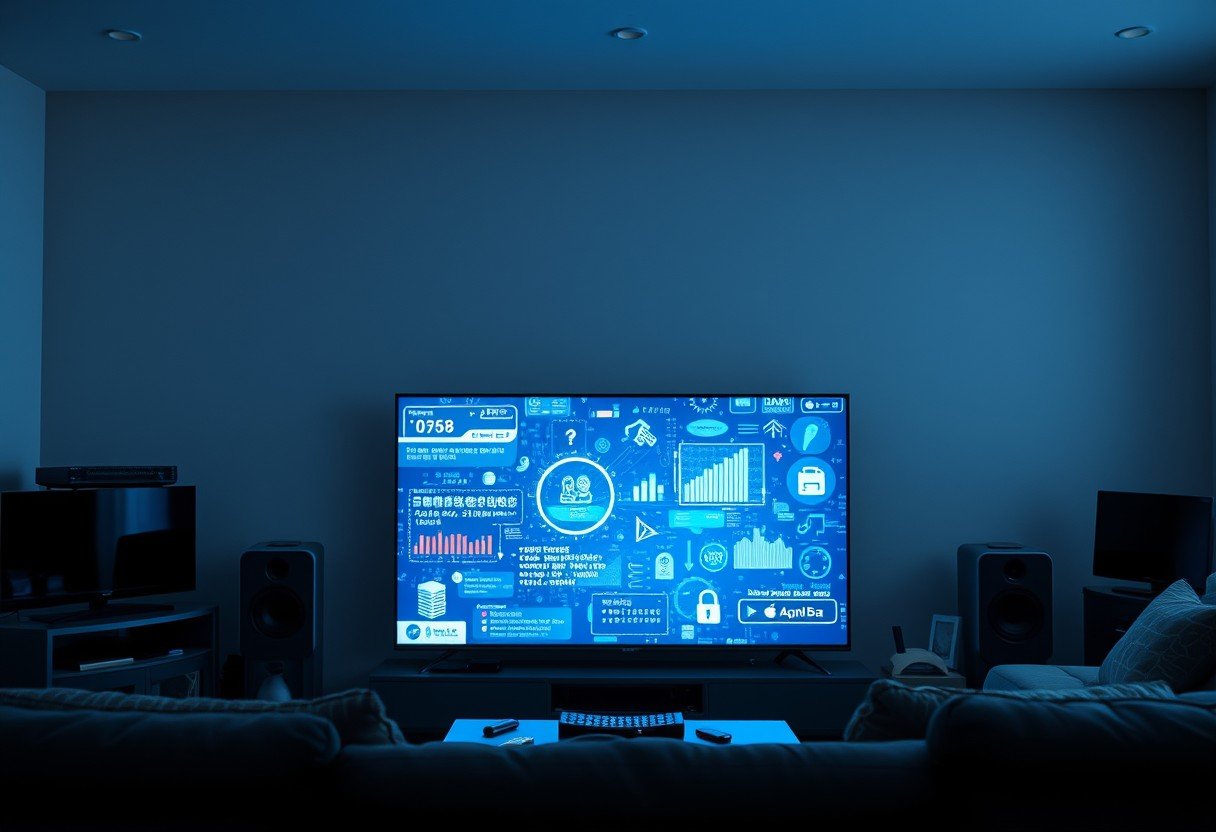You might love the convenience of your smart TV, but did you know it could be watching and listening to you? These internet-connected devices can collect data on your viewing habits and even private conversations, raising serious privacy concerns. This guide explains how smart TVs can be used for surveillance, what the risks are, and what simple steps you can take to protect yourself and your family in your own living room.
How Do Smart TVs Collect Your Data?
Unlike old televisions, smart TVs are essentially computers with large screens. They run on operating systems similar to your smartphone and are constantly connected to the internet. This connectivity is what allows them to stream content, but it’s also how they gather your information.
Manufacturers and app developers collect data to understand user behavior. They track which shows you watch, how long you watch them, the apps you use, and even the ads you see. This information is primarily used to create a profile about you for targeted advertising and content recommendations.
This data is often shared with third parties, including advertisers and data brokers, without you realizing it. While companies claim this improves your user experience, it means your personal viewing habits are being packaged and sold as a commodity.
What Features Enable TV Surveillance?
Several key features built into modern smart TVs can be used for surveillance. The most common ones are the microphone for voice commands and Automatic Content Recognition (ACR) technology, which identifies everything you watch.
ACR technology scans what you’re watching on screen, whether it’s from a streaming app, a cable box, or even a video game console. It then sends this information back to the manufacturer or their partners. Similarly, built-in microphones are always listening for a “wake word” to activate a voice assistant, which raises concerns about what else they might be hearing.
Some high-end TVs also come with built-in cameras, intended for video calls. If not secured, these cameras could potentially be accessed by hackers, giving them a direct view into your home.
| Feature | Intended Purpose | Potential Privacy Risk |
| Microphone | Voice Commands & Search | Recording private conversations |
| Automatic Content Recognition (ACR) | Personalized Recommendations | Tracking every show, movie, and ad you watch |
| Camera | Video Calls | Unauthorized visual surveillance |
Understanding the Privacy Risks You Face
The data collection practices of smart TVs pose significant risks to your personal privacy. Your private conversations could be inadvertently recorded and sent to third-party contractors for analysis, often without your clear and informed consent.
The lack of transparency in how this data is handled can lead to unauthorized surveillance and a serious breach of your privacy. Furthermore, the stored data creates a tempting target for hackers. A data breach could expose not only your viewing habits but also personal information linked to your TV’s account, such as your email address or location.
Are There Laws to Protect You?
While technology has advanced quickly, privacy laws have struggled to keep up. However, some regulations do exist to offer consumers a degree of protection. For example, the General Data Protection Regulation (GDPR) in Europe and the California Consumer Privacy Act (CCPA) in the United States set rules for how companies must handle user data.
These laws require companies to be more transparent about what data they collect and give you the right to access or delete your information. However, the legal language can be confusing, and the protections vary greatly depending on where you live.
Ultimately, it is often up to you, the consumer, to be proactive in protecting your own privacy. Relying solely on regulations may not be enough to keep your data secure.
Simple Steps to Secure Your Smart TV
Protecting your privacy doesn’t mean you have to get rid of your smart TV. You can take several simple but effective steps to reduce the risk of surveillance and take back control of your personal data.
The most important step is to explore your TV’s privacy settings menu. Manufacturers are required to give you options to control data collection, but these settings are often enabled by default. Taking a few minutes to review and adjust them can make a huge difference.
Follow these steps to enhance your TV’s security:
- Disable ACR: Look for a setting named “viewing information,” “viewing data,” or “syncing,” and turn it off. This will stop the TV from tracking what you watch.
- Turn Off Voice Recognition: If you don’t use voice commands, disable the microphone in the settings. This prevents the TV from listening in.
- Cover the Camera: If your TV has a built-in camera, place a piece of tape or a dedicated camera cover over the lens when you’re not using it.
- Limit Ad Tracking: Find the setting for “interest-based advertising” or “ad personalization” and turn it off to limit how your data is used for ads.
- Update Your Software: Regularly check for and install software updates. These updates often include critical security patches that protect against new threats.
You can also consider using a streaming device like a Roku or Apple TV connected to a non-smart television. These devices often have more straightforward privacy policies and settings, giving you greater control over your data.
What’s Next for TV Surveillance and Privacy?
The future of television technology will likely bring even more advanced features, and with them, new privacy challenges. Emerging technologies like facial recognition could allow TVs to identify who is watching and tailor content accordingly. While this offers a new level of personalization, it also deepens surveillance capabilities.
As consumers become more aware of these issues, we can expect a growing demand for stronger privacy protections. This may lead to tighter regulations and force manufacturers to design products with privacy as a core feature rather than an afterthought.
Staying informed about the technology you bring into your home is your most powerful tool. By understanding how these devices work and being vigilant about your settings, you can enjoy the benefits of smart technology without sacrificing your right to privacy.
Frequently Asked Questions
Can my smart TV really listen to my conversations?
Yes, if your smart TV has a voice recognition feature, its microphone is technically always on to listen for wake words. While manufacturers state they only record after a command is given, accidental activations and data handling errors can lead to private conversations being recorded.
How do I turn off data collection on my TV?
Navigate to your TV’s settings menu and look for a section labeled “Privacy,” “Terms and Policies,” or “General.” In this section, you should find options to disable Automatic Content Recognition (ACR), interest-based advertising, and voice data collection.
Is it safer to use a streaming stick like a Roku or Fire TV?
In many cases, yes. While streaming devices also collect data for advertising, they typically do not have built-in microphones or cameras that are always active. Their data collection is often more focused on app usage, and their privacy settings can be easier to manage than those on a smart TV.
What happens to the data my smart TV collects?
The collected data is typically anonymized and aggregated to analyze viewing trends, improve services, and sell targeted advertising space. It is often shared with or sold to data brokers, advertising networks, and other third parties who use it to build detailed profiles of consumers.
Can my smart TV be hacked?
Yes, like any internet-connected device, a smart TV is vulnerable to hacking. A hacker could potentially gain access to your TV to spy on you through the camera and microphone, steal personal information, or use it to attack other devices on your home network.
Do all smart TV brands have the same privacy risks?
While most smart TVs collect data, the specific policies and the ease of managing privacy settings vary by brand. It is always a good idea to research a brand’s privacy policy before making a purchase and to review the settings carefully once you set up the device.









Leave a Comment